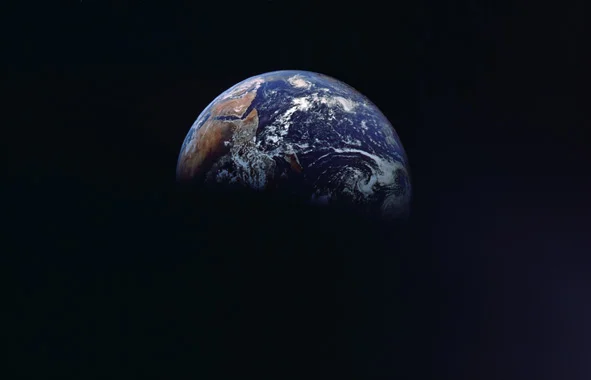Earth is the third planet from the Sun.
It is the fifth largest planet in our solar system.
Earth is 150 million kilometres away from the Sun.
It orbits (moves around) the Sun.
It takes one year (365 days) for the our planet to orbit the Sun once.
Our planet Earth
Our planet has one moon. It is about one-quarter the size of the Earth.
The moon takes about 27days and 7 and a half hours to orbit the Earth once.
When the sun, the moon and Earth are in a line, a solar eclipse occurs over half the planet. ©Getty Images
Earth spins on its axis in an anti-clockwise direction and takes 23 hours 56 minutes to rotate (turn) once.
Earth photographed from outer space. ©Getty Images
Because of its position in the Solar System, and because its atmosphere contains oxygen, hydrogen and carbon, Earth is the only planet where life is known to exist.
Scientists believe that the planet is 4.54 billion years old.
Structure of the Earth
The Earth is made up of several layers. There is an outer solid crust, then a mantle, then a liquid outer core, and finally a solid inner core.
iStock
The atmosphere, the layer of gases that surround the planet, contains nitrogen, oxygen, water vapour, carbon dioxide and small amounts of other gases.
This atmosphere protects life on the planet from harmful ultra-violet rays from the Sun.
Planet Earth Facts:
Mass: 5,972,190,000,000,000 billion kg
Equatorial Diameter: 12,756 km
Polar Diameter: 12,714 km
Equatorial Circumference: 40,030 km
Known Moons: 1
Orbit Period: 365.26 Earth days
Surface Temperature: -88 to 58°C
It’s a good idea to get information from more than one source!
How do we know what the Earth’s mass (weight) is? It’s complicated, but you might want to know how it is calculated!
https://science.howstuffworks.com/environmental/earth/geophysics/planet-earth-weigh.htm
Read more about the Earth's core :
https://www.natgeokids.com/au/discover/geography/physical-geography/structure-of-the-earth/
https://www.ducksters.com/science/composition_of_the_earth.php





